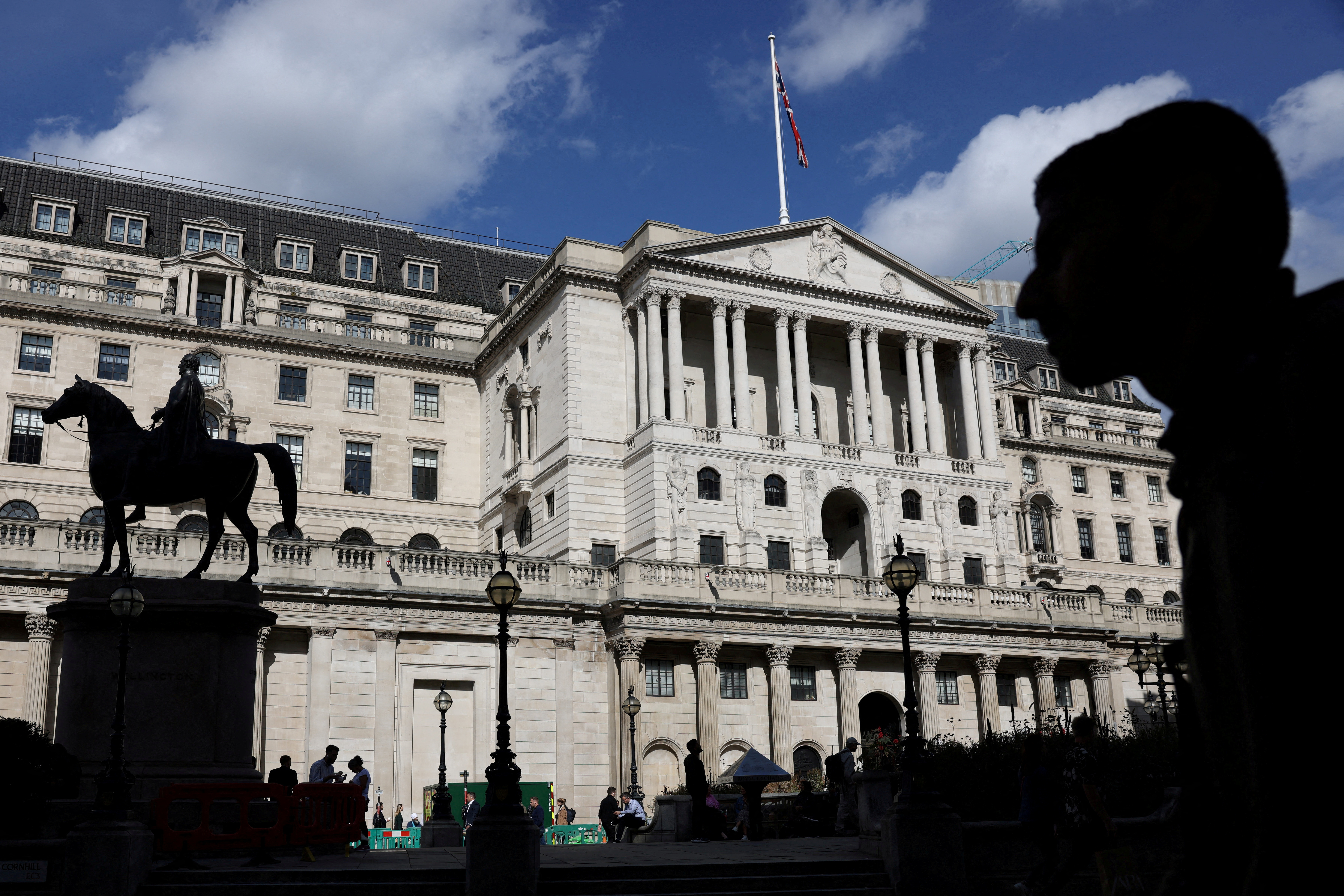Fed stands alone as ECB, BoE stick with tight policy

A pedestrian walks past the Bank of England in the City of London, Britain, September 25, 2023. REUTERS/Hollie Adams/File Photo Purchase Licensing Rights
WASHINGTON/FRANKFURT, Dec 14 (Reuters) - The U.S. Federal Reserve was left in a camp of its own on Thursday when a host of Europe's central banks stuck to plans to keep policy tight well into next year, dashing any hope that the Fed's pivot towards rate cuts marked a global turning point.
Extending the hawkish stance that has dominated global central banking through two years of excessive inflation, the European Central Bank said policy easing was not even brought up in a two-day meeting, the Bank of England said rates would remain high for "an extended period," and Norway's central bank even hiked rates.
The hawkish stance came just hours after Fed Chair Jerome Powell said rate hikes were likely over in the U.S. and lower rates were coming into view, with 75 basis points worth of cuts expected by policymakers next year, comments that bolstered rate cut bets on both sides of the Atlantic.
"We’ve seen a rather remarkable divergence in central bank communications," Matthew Ryan, head of market strategy at financial services firm Ebury, said.
"While the ECB and Bank of England hold the line, and indicate that lower rates remain some way off, the Federal Reserve has actively encouraged markets to pencil in a more aggressive pace of U.S. policy easing."
ECB President Christine Lagarde batted back any suggestion of an ECB pivot, making the case for a plateau at least until more definitive wage data come into view, probably next spring.
"We did not discuss rate cuts at all," she said. "No discussion. No debate... Between hike and cut there is a whole plateau," Lagarde told a news conference.
"We absolutely should not lower our guard," Lagarde said, noting that some components of inflation were "not budging."
The pushback came even as the bank lowered inflation projections, putting price growth back at its 2% target by late 2025, despite some uptick in prices over the coming months.
At the BoE three policymakers continued to make the case for another rate increase and Norway's central bank voted for a surprise quarter-point rate hike, given more persistent inflation that could now require steady rates until late 2024.
The Swiss National Bank was the least hawkish, pointing to declining inflation, construed by analysts as a sign of possible rate cuts next year - something its policymakers remained silent on.
MARKETS STILL BETTING ON CUTS
The concerted push back did little to temper market expectations.
Investors expected six rate cuts from the ECB next year with almost two moves seen by April. For the BoE, over four quarter-point cuts were priced in for 2024, with the first one seen in May.
"We think the (BoE) is pushing back against the idea of early easing to try to limit the extent to which financial conditions loosen and to send a strong message ahead of the new year pay round," Oxford Economics said in a note.
"Still, the MPC's tougher language is not just a tactical ploy. It largely reflects evidence that the UK has higher rates of services inflation and pay growth than the U.S. and eurozone," it added.
The BoE said its headline inflation was expected to remain around 4.5% through the end of this year, still well above the 2% inflation target it shares with the Fed and ECB.
That's also well above new Fed projections showing core inflation ending 2023 at 3.2% with strong arguments, given recent behavior in producer prices and rents, that it will continue falling.
By end-2024 Fed officials project both core and headline inflation will be 2.4%, within striking distance of their goal and low enough for Fed officials to anticipate rate reductions.
"We are seeing strong growth that ... appears to be moderating. We are seeing a labor market that is coming back into balance ... We're seeing inflation making real progress," Powell told reporters.
"These are the things we've been wanting to see ... Declaring victory would be premature ... But of course the question is 'when will it become appropriate to begin dialing back?'"
With the Fed now seen as the early mover to lower rates among the major central banks, the dollar slid to a four-month low against a basket of trading partners' currencies.
The BoE's and ECB's refusals to follow in the Fed's footsteps slowed the rally in British and European bonds, with benchmark yields in the regions near their highs of the day after the two announcements, though they remained lower than on Wednesday.
Sign up here.
Reporting by Howard Schneider and Balazs Koranyi; Editing by Andrea Ricci
Our Standards: The Thomson Reuters Trust Principles.
